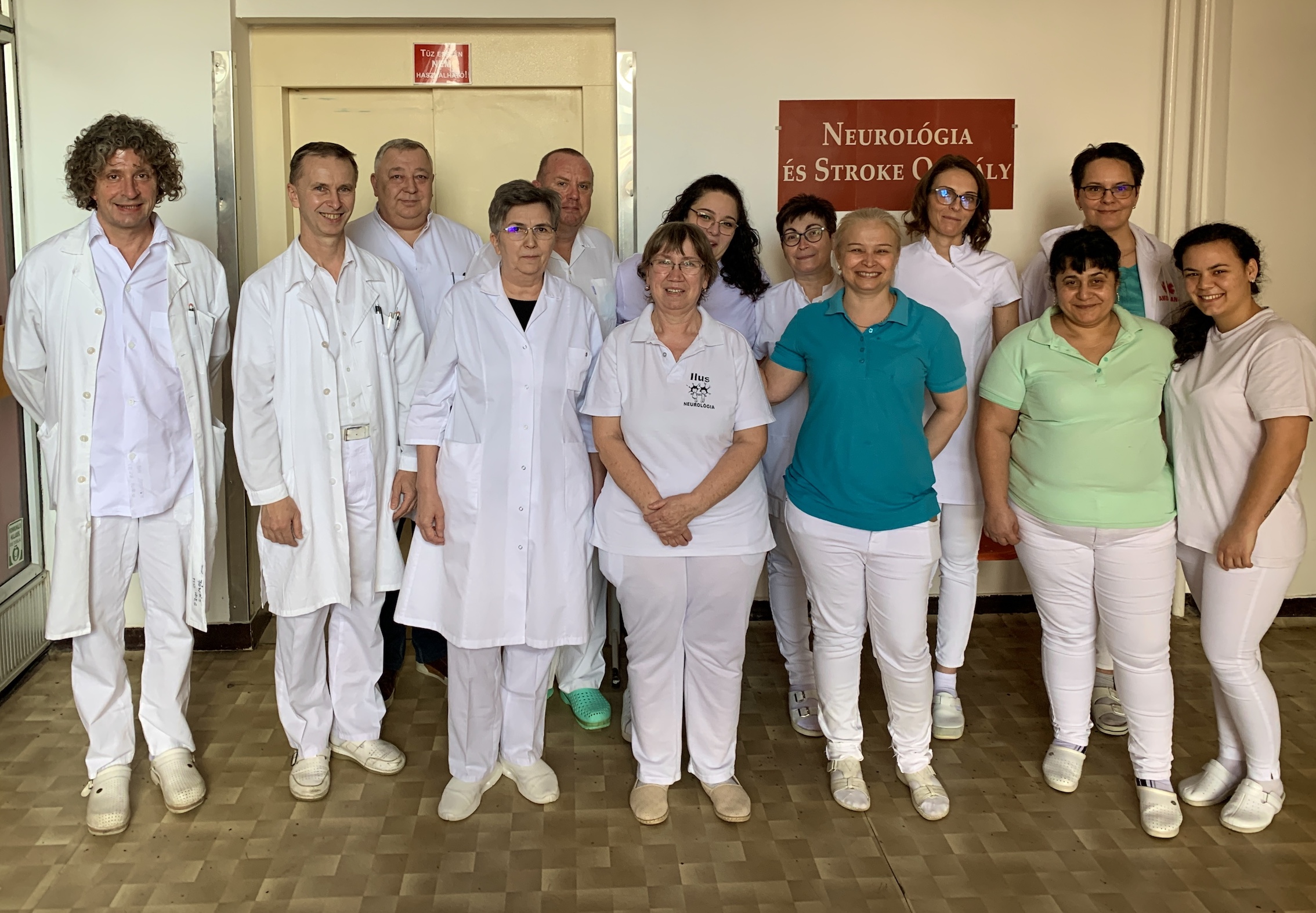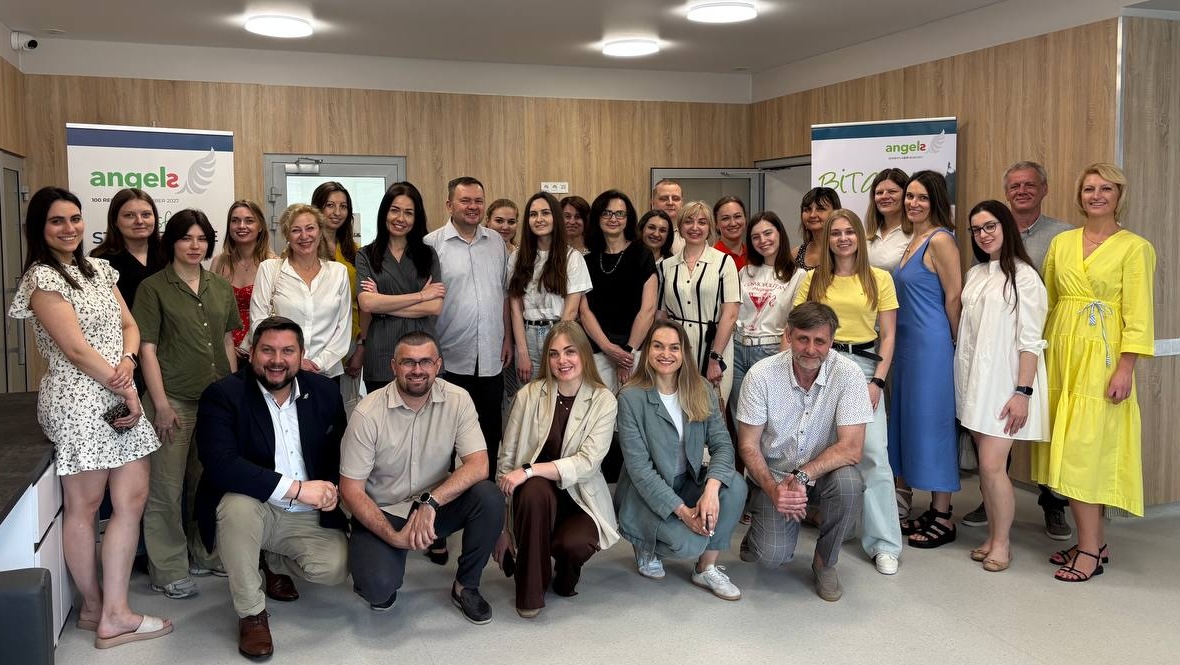
Mátészalka este al doilea oraș ca mărime din districtul Szabolcs-Szatmár-Bereg din nord-estul Ungariei, fiind totuși suficient de mic pentru a ajunge pe jos. Se află la 52 de kilometri est de capitala districtului Nyiregyhaza și la mai puțin de o oră de mers cu mașina de frontierele slovaciei, Ucrainei și României.
Departe de Budapesta cosmopolită, vizitatorul rar poate fi surprins să găsească cafeneaua Tony Curtis pe Strada Kossuth nr. 16. Face parte dintr-un centru de artă comunitară înființat recent de actrița americană Jamie Lee Curtis în ceea ce a fost cândva sinagoga din orașul ei natal al bunicilor, pentru a onora rădăcinile maghiare ale faimosului ei tată.
La câteva străzi distanță, pe strada Kórház, este adevăratul motiv pentru care v-am adus aici – la intrarea Spitalului Mátészalka, unde neurologul șef, Dr. Judit Incze, conduce o echipă de AVC îndrăzneață, care tocmai a câștigat al doilea său premiu Angels de aur.
Spitalul Mátészalka aparține unei rețele medicale cunoscute din 2013 sub denumirea de Szabolcs-Szatmár-Bereg County Hospital și University Teaching Hospital, dar cu origini încă din 1932, a fost martorul unei epoci turbulente. În prezent, acesta deservește o populație de aproximativ 150.000 de persoane care locuiesc în oraș și în satele din jur.
Tratamentul AVC a început la acest spital în 2013 datorită eforturilor predecesorului Dr. Incze, care după câțiva ani ar primi sprijinul Angels pentru optimizarea traseului AVC. Singurul centru de AVC de-a lungul milelor parcurse, acesta admite acum un număr de peste 400 de pacienți cu AVC acut pe an, dintre care aproximativ 10% sunt tratați cu tromboliză.
Un angajament față de îmbunătățirea bazată pe date
Colectarea datelor despre AVC a ieșit încet din teren în Ungaria. În 2017, Clinica de Neurologie din cadrul Facultății de Medicină de la Universitatea Semmelweis a devenit prima care și-a înregistrat datele în RES-Q și primul spital din Ungaria care a primit un premiu Angels. Numărul de spitale din RES-Q a crescut la 13 în 2020, dar până în prezent doar 40% dintre spitalele din țară participă la proiectul anual de colectare a datelor despre AVC.
Că Spitalul Mátészalka se numără printre puținele spitale care au devenit eligibile pentru programul Premiile Angels printr-un angajament pentru monitorizarea calității, este mărturia convingerii Dr. Incze în îmbunătățirea bazată pe date și eforturile sale de a insufla o mentalitate bazată pe calitate în echipa sa. Ea este cea care extrage datele din dosarele pacienților, înregistrează pacienții în RES-Q, studiază feedbackul pentru a identifica lacunele și conduce ședințe regulate despre oportunitățile de îmbunătățire care rezultă din date.
Al doilea aur este dovada faptului că echipa de AVC de la Spitalul Mátészalka face deja multe lucruri corect. Datorită notificării prealabile a SMU – o acțiune prioritară cheie – neurologul și echipa sa așteaptă sosirea pacientului, și nu invers. Acestea însoțesc pacientul la sala de CT și previn întârzierile tratamentului, bazându-se pe testarea la punctul de îngrijire pentru luarea deciziilor ori de câte ori este posibil.
Deși conștientizarea scăzută a AVC-ului în rândul populației locale înseamnă că un număr semnificativ de pacienți sosesc inevitabil în afara intervalului de tratament, Dr. Incze este hotărât că „toți pacienții sosesc ca candidați la tromboliză, până când se decide altfel”. Aceasta înseamnă că echipa de AVC de la Spitalul Mátészalka se angajează să găsească motive pentru a trata pacientul, în loc să caute motive să nu facă acest lucru.
Supraviețuirea pandemiei
Cu cea de-a treia cea mai mare rată de deces cauzat de Covid din Europa, pandemia a afectat Ungaria și a pus spitalele sub o presiune inimaginabilă. Îngrijirea AVC a fost afectată aici, la fel ca în Europa, din cauza faptului că personalul a fost trimis în secțiile de Covid și s-au redus paturile, unitățile CT au fost copleșite și pacienții au rămas departe de teamă.
La Spitalul Mátészalka, efortul fără precedent a însemnat că echipa de AVC abia a avut timp să sărbătorească primul lor premiu Angels sau să reflecteze asupra faptului că a câștigat această distincție în timpul unei crize globale de sănătate. „Singura noastră strategie a fost să sperăm că se va termina la un moment dat – este mult mai greu când nu puteți vedea sfârșitul unei crize”, își amintește Dr. Incze.
Premiul a dat naștere la spirite și câștigarea unei secunde a oferit acum și mai multă validare pe fondul preocupărilor că deficitele de personal ar putea pune în pericol viitorul îngrijirii AVC-ului la acest spital.
„Ne-am bucurat foarte mult. Oamenii au fost recunoscuți pentru faptul că au muncit atât de eficient”, spune Dr. Incze. Cu toate acestea, rămâne îngrijorată de faptul că deficitul de personal ar putea însemna că este posibil ca în viitor pacienții cu AVC să trebuiască transferați la Nyiregyhaz la mai mult de 50 de kilometri distanță.
Ea spune: „Sper doar că centrul de AVC va rezista în Mátészalka. Deoarece orașele sunt atât de îndepărtate unul de celălalt, este absolut necesar.”



